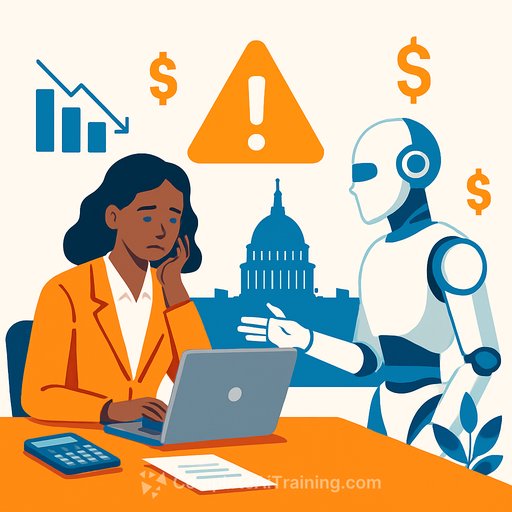Top 5 Financial Services Jobs Most at Risk from AI in Washington, D.C. — And How to Adapt
Washington, D.C. is a unique finance hub where policy meets practice. This intersection means that AI’s impact on local finance jobs is happening faster here than in many other places. Federal and district-level regulations emphasize responsible AI use, transparency, and bias mitigation. This focus puts routine, process-driven roles under the highest automation threat—unless professionals upgrade their skills.
Here’s a clear picture: entry-level financial analysts, accounts payable specialists, junior treasury and investment research analysts, and data-entry associates in D.C. face automation risks that could affect up to two-thirds of junior roles. The solution is practical—learn AI literacy, get hands-on with treasury management systems (TMS) and enterprise resource planning (ERP) tools, and master robotic process automation (RPA) and optical character recognition (OCR) for exception handling. Staying audit-ready is key.
How We Identified the Top 5 At-Risk Roles in D.C.
The selection combined regulatory insights, market trends, and detailed task analysis. The Government Accountability Office’s 2025 review of AI oversight, market moves from firms like J.P. Morgan, and studies on automation in high-data environments shaped the findings.
Roles were ranked based on three factors:
- Regulatory demands for explainability and compliance
- Repetitive, data-heavy daily tasks
- Rapid adoption of AI platforms and automation tools
This approach highlighted jobs heavily involved in back-office reconciliation, automated credit scoring, and high-volume transaction processing.
Entry-Level Financial Analyst: Risks and How to Adapt
Entry-level analysts often handle data entry, report generation, and basic modeling—tasks AI can do faster and more accurately. Estimates suggest up to two-thirds of these roles could be impacted. Washington-based banks and nonprofits that rely on timely financial reporting will increasingly expect analysts to add value beyond number crunching.
To stay relevant, analysts should build skills in data wrangling, reproducible modeling, and basic programming or automation. Equally important are human skills like client judgment, storytelling with scenarios, and cross-team collaboration. Employers can support this by embedding AI literacy into onboarding and encouraging analysts to "own" higher-value responsibilities.
Accounts Payable Specialist: Risks and How to Adapt
Automation tools now capture invoice data, route approvals, and perform multi-way matching faster than manual processes. This shift reduces the need for manual invoice entry, putting AP specialists at risk.
Adaptation means moving from data entry to managing exceptions and controls. Specialists should focus on designing vendor workflows, running exception reviews, and managing self-service vendor portals to reduce communication bottlenecks. Using AI to auto-categorize exceptions and setting clear service-level agreements (SLAs) with procurement teams will also be crucial to avoid audit issues.
Junior Treasury Analyst: Risks and How to Adapt
Junior treasury analysts monitor cash, reconcile accounts, and produce reports relied upon by regulators and executives. These repetitive, rules-based tasks are prime automation targets.
Adapting means mastering the treasury tech stack—TMS, ERP integrations, and AI-driven forecasting. Analysts should evolve into liquidity strategists, turning automated cash position data into actionable insights while keeping strong controls and audit trails. Employers in D.C. can accelerate this shift by funding hands-on training and redefining junior analysts as strategy partners rather than ledger clerks.
Junior Investment Research Analyst: Risks and How to Adapt
Junior research analysts spend time gathering data, compiling reports, and creating draft presentations—tasks AI can replicate with ease. Their value will increasingly come from interpreting and validating AI outputs.
Professionals should learn statistical tools, build reproducible workflows, and create compelling visualizations. Partnering with data engineering teams and owning client-facing narratives will also help ensure AI-generated insights are audited and defensible.
Data Entry / Financial Operations Associate: Risks and How to Adapt
Data-entry roles are the frontline for AI automation in finance. Technologies like intelligent document processing (IDP), OCR, and RPA can automate invoice capture, expense coding, and reconciliations.
That means the human role shifts to exception handling, validation, and maintaining audit trails. Associates should learn basics of IDP/OCR and RPA, own exception workflows, and lead pilots to fine-tune automation rules while ensuring compliance.
Next Steps for Washington, D.C. Finance Professionals
Adaptation in D.C. means practical reskilling paired with policy awareness. Local initiatives like Mayor Bowser’s “Pathways to Finance” program connect youth to finance careers, strengthening pipelines. Community programs such as Tzedek DC’s Young Adult Financial Empowerment course also boost financial literacy.
For professionals already in the field, focused AI training that teaches prompt skills and workflow integration is essential. Short, hands-on courses help finance teams validate and oversee AI outputs, ensuring audit readiness. Employers should support pilots, designate exception workflow owners, and treat upskilling as both a compliance necessity and a retention strategy.
Explore targeted AI finance courses to build relevant skills and stay ahead: Complete AI Training – Courses by Job.
Frequently Asked Questions
- Which financial services jobs in Washington, D.C. are most at risk from AI?
Entry-level financial analyst, accounts payable specialist, junior treasury analyst, junior investment research analyst, and data entry/financial operations associate. - What criteria determined these roles’ exposure to automation?
The analysis combined regulatory guidance, market automation trends, and detailed task mapping linking AI use cases to daily job duties. - How can Washington finance professionals avoid displacement?
By reskilling with practical AI literacy and tool fluency focused on job-specific workflows and exception management. - How do local policies affect AI adoption and workforce risk?
Washington’s federal and district regulations emphasize responsible AI use, making compliance as important as innovation, which shapes workforce demand. - What local resources help DC finance workers reskill?
Programs include city-led initiatives like “Pathways to Finance,” community education courses, and employer-funded, short-form AI training.
Your membership also unlocks:






